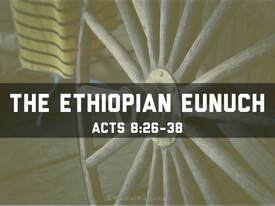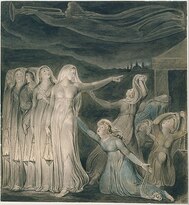
 ‘Do you understand what you are reading?’ Philip’s question in Acts of the Apostles chapter 8 is such a great one, and it echoes down the centuries. Do we understand what we are reading when we read scripture? Whether we are conservative or varying degrees of liberal, it is easy to think we do. But do we really? This question is one reason that we have a sermon, or homily, or, as this community likes to call it, a reflection, in worship. For, as the eunuch responds, how can we understand unless we have a guide? The alternative is just using scripture as a looking glass, reflecting only our own faces, hopes, fears, and presuppositions. Note well, a guide to scripture is not a simple giver of answers, and certainly not determinative for all times and places. For we continue to reflect on scripture, again and again, precisely because God’s living Word, capital ‘W’, is revealed in scripture but is not fixed within its small ‘w’ words. Rather, as the great biblical interpreters have always said, God’s living Word emerges out of scripture in the encounter of human beings with the text, as guided by one another, our contexts and our deep Tradition, through the power of the Holy Spirit, the ultimate guide and inspirator. This is crucial to recall, lest we are tempted to believe that scripture is too easily understood: whether over-exalted into an idol or a supposed instruction manual, as conservatives are sometimes drawn to do; or reduced to a mere item of intellectual curiosity or piece of cultural heritage, as progressives are inclined to do. Either way, that loses the real subversive power of faith which scripture can hold for us, particularly in stories such as of the Ethiopian eunuch: which, in my view, is one of the most subversive of all in scripture, not least in its queering dimensions…
0 Comments
Jesus is the good shepherd. Hopefully we all know that. Those of us who went to Sunday school learnt this in the first lesson often accompanied by a picture of a rather anaemic looking Jesus with flowing locks, cuddling a snowy white lamb who had clearly never done a day’s manual labour in their life! Is that right?...
 image: Kamala Bright on Unsplash image: Kamala Bright on Unsplash ‘Tell me the old, old story, when you have cause to fear.’ Yes? No? Maybe? How do you respond to that: and, more broadly, to faith, and God, in Jesus, as story? Many years ago, on the radio, one of the radical thinking clergy of the Church of England was asked about how they understood God. ‘God’, they said, ‘is the poem in which I live my life.’ Yes? No? Maybe? Does that resonate with you? Many people, secular and faith-based, would be quite dismissive. Stories, and poems not least, they would say, are typically fanciful and not factual, fabricated and too often false. Of course, that kind of response generally lacks self-awareness and is very narrow, and, often, quite ideological. Apart from not recognising that different expressions of life have their own characteristics and validity, they typically miss the way in which story, metaphor, and symbol, exist within all areas of knowledge. Science for example is full of different models, and ideas like evolution are themselves stories. Scientists are right in saying that life-giving stories are helped by empirical verification. Yet, without stories as such, it is impossible for human life and consciousness to exist. That is something that liberals and progressives, especially in faith spaces, have often missed. It is not enough to point out the weaknesses in a tired traditionalist story: whether that be about creation, sexuality, or anything else. Even more importantly, we also need to tell a new story. Populist politicians, like rabble-rousing religious preachers, know this well. Facts are malleable but stories, once established, persist: whether they are particular ways of understanding the body, the nation, the world, and, of course, God. All of us therefore have stories, conscious and unconscious, running through our heads: some of them planted there long ago, some of them picked up from the latest social media frenzy; some of them giving life-giving purpose to our lives, others providing scripts that limit us but which are hard to shake off. What then is our story?... One of my favourite contemporary spiritual songs is that which we heard before the beginning of our worship today – ‘I Am Mountain’ by Gungor (see YouTube link above). The lyrics are evocative of both rich ancient understandings and the best insights of modern life and science. They speak of profound presence, of the immanence and transcendence of the divine. They direct us to the heart of the life-giving spirituality of this Season of Creation. For, in Gungor's words, and ancient Christian orthodoxy proclaims, ‘there’s glory’ (‘beauty’ and ‘mystery’) in the dirt.’ As Christian, and other mystics, have affirmed, there’s ‘a universe within the sand, eternity within’ a human being. Often, we may indeed feel ourselves to be ‘wandering in skin and soul/ Searching, longing for a home’. Yet in truth, in memorable phrases, we are invited to see ourselves as:
Momentary carbon stories From the ashes Filled with holy ghost In the face of the climate emergency, we are also called, by ‘the light’, to ‘fight, fight for our lives’ - as we have also explored, particularly in last week’s reflections and discussions. However, above all, we are encouraged to acknowledge more deeply the wonder of the divine existence we share. For we are intimately related to our extraordinary world. All metaphors, as Gungor says, then begin to break down in the face of this astounding mystery and reality, as: Life is here now Breathe it all in Let it all go You are earth and wind…  photo:Priscilla du Preez. Unspash photo:Priscilla du Preez. Unspash What is there to eat in the Christian scriptures? It can often be challenging for many people to find answers to that. We live, after all, in very different times from those in which the books of the Bible were composed. It is not, of course, a new question. Decades ago, at theological college, I recall a leading biblical scholar, a Canon of Christ Church Oxford, throwing a similar testing query to myself and my fellow students. If we were to omit books from the Bible on grounds of significant racism, anti-semitism, sexism, and other forms of violence, with how many would we be left? Which books of the Bible would you keep? Canon John Fenton’s immediate answer was only three: Mark's Gospel, the Letter of James, and the book of Revelation. However, in subsequent discussion, he himself agreed that each of those scriptures also had problematic features. As we hear again today part of the Gospel of John chapter 6, what then are we say about, and still more feed upon, in the books we call ‘holy' scriptures?...  photo: Saad Chaudry, by Unsplash photo: Saad Chaudry, by Unsplash Almost a hundred years ago, a notable book of English Modernist theological essays was published. One leading conservative voiced a classic critique. The book, he said, was a typical example of liberals thinking less about God and far too much about a secular audience. Liberals, he alleged, are constantly asking ‘what will Jones swallow?’ – Jones being the name for the supposed average person in the street. The response from the editor of the book was swift. ‘I am not asking what Jones will swallow’, he retorted, ‘I am Jones themselves, asking what there is to eat.’ For there is a big difference, isn’t there? The idea of asking ‘what will Jones swallow?’ is undoubtedly a conservative prejudgment of liberal intentions. Yet it can be one unfortunate dynamic in faith circles, sadly leading down the path of reductionism and beyond. Asking ‘what is there to eat?’ is a much more radical and open question, possibly leading even to revisiting aspects of diets left aside in the past. For a self-confessed ‘progressive’ church like Pitt Street Uniting Church, it is certainly a question which needs to be at the heart of our healthy spiritual pathways. After all, as the missionary theologian D.T. Niles once memorably said, sharing the Good News is essentially about ‘one beggar telling other beggars where to find bread.’ So what does this food look like today? And what does our reading this morning from John’s Gospel have to say? For John chapter 6 is a lengthy excursus on the bread of life, and how it may be found, or not. What challenges, and opportunities, does this raise for us, as individuals, and as a community together, at this stage in our development?...  Our little confirmation group had a spirited conversation last week, looking at Scripture and how it came to be formed and how we might now interpret it. We were helped along by the early realisation that most of us have what was described as a ‘pick and MISS’ relationship with scripture. Now if that idea offends you, you might want to shut your ears for a few minutes. What we meant was that not all of scripture nourishes us – and certainly not all of scripture nourishes us all, all of the time. In fact, some of it could be seen as down-right dangerous and bad for our mental health. This brings us to today’s parable – which quite frankly I might have been inclined to put in the ‘miss’ bucket. It is attributed only to Matthew, which might give us pause to begin with, and its sentiments seem to run counter to much of what Jesus says in other places. But here it is in the lectionary, so what are we going to do with it?...  For some of my early years, my heart would sink when I was invited to join a bible study group. My mind would start screaming, and my body sometimes even began twitching. Maybe you, or others you know, have had that kind of experience - of bible studies, or another avenue of faith exploration? For me, it wasn’t that the people who asked me were often a little unctuous, or patronising about my existing faith. Sometimes they were wonderful, beautiful, humble, with an open and expansive love of God and others. It was just that so many bible studies seemed so very narrow. Where they weren’t working with extraordinary assumptions about sin, God, and the way the world is created, they were often, frankly, simply a little boring. My experience in many Christian groups was that the scriptures were typically read as if they were flat in nature: straightforward and easy to interpret. This was because simplistic frameworks, or sets of formulae, were constantly applied to every passage. After I’d been to one bible study, I pretty much picked up the central message. Just repeating it again and again seemed neither interesting nor life-giving. When it was full of shame and guilt-inducing misdirection it was particularly alienating. Yet what an awful misuse that is of the Bible, and not least, Jesus’ own use of Scripture…  I love being trans. How about you? No, I am not so much speaking about being transgender, as about simply being human, or at least a Christian variety thereof: in other words, about being a person who is transfiguring. That is each and every one of us. This is not to downplay the significance of someone being transgender, or otherwise. After all, we still have some way to go in working through that. The particularity of each of our human lives really matters. Each transgender life and story is also unique: a special creation in God’s love. Yet, the more I reflect upon it, in a powerful sense, in the divine economy, being transgender is also a way of helping us all recognise that each of us is continually invited to embrace transfiguration. For, as human beings, as Christians, we are never fixtures but loved works in process. What we shall be is not what we are now. All that is loving in our past and present is indeed taken up into what we shall be. In the glory of God however, we are, and will be, so much than we can ever imagine. This is part of the gift of the Feast of the Transfiguration of Christ which we celebrate today… One of the most memorable, transforming, and ultimately deeply poignant sermons I ever heard was at theological college, over thirty years ago, when I was what we now call a formation student. The address was given by an American student who was with us for a short while. It was on the subject of Peter’s dream in the Acts of the Apostles and the remarkable turnaround in the early Church which we hear about in Acts chapter 15 today. Far from being remote events, my fellow student brought them alive in an intensely powerful way. This, you may understand, was during the last tumultuous days of controversy before the ordination of women in the Church of England and in the first real stirrings of pain and freedom among LGBTIQ+ people across the world. Yet, challenging though those things were, and still are some even today, they are nothing, my fellow student pointed out, to the radical transformation we find in these texts from Acts. For centuries, almost forever really, we, the Gentiles, with our characteristics and our lifestyles, lay outside full inclusion in the body of God’s community. Yet Paul, Peter, and even James, the bulwark of Jewish Christian foundations, came to welcome us as equals in the life of salvation. In contrast, how much lesser such a conversion is asked of us, said my fellow student. So can we, as Peter, as Church, embrace today those who also who, like the Gentiles long ago, not only come to us, but even flourish among us, against the odds, against our human-fashioned, provisional rules?...
|
Authors
sermons and reflections from Penny Jones & Josephine Inkpin, a same gender married Anglican clergy couple serving with the Uniting Church in Sydney Archives
June 2024
Categories
All
|
 RSS Feed
RSS Feed